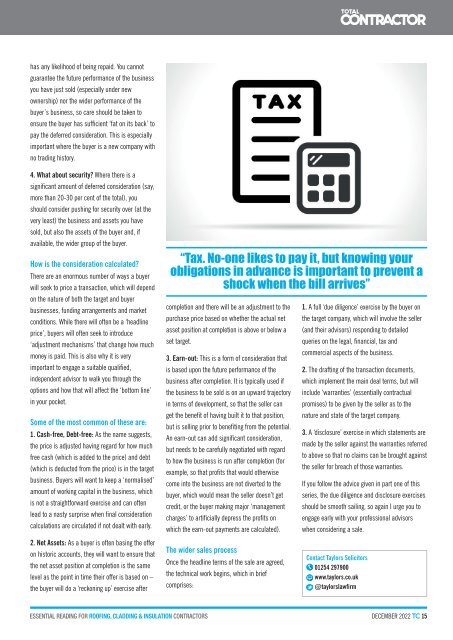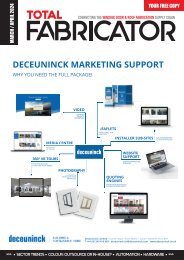December 2022
Create successful ePaper yourself
Turn your PDF publications into a flip-book with our unique Google optimized e-Paper software.
has any likelihood of being repaid. You cannot<br />
guarantee the future performance of the business<br />
you have just sold (especially under new<br />
ownership) nor the wider performance of the<br />
buyer’s business, so care should be taken to<br />
ensure the buyer has sufficient ‘fat on its back’ to<br />
pay the deferred consideration. This is especially<br />
important where the buyer is a new company with<br />
no trading history.<br />
4. What about security? Where there is a<br />
significant amount of deferred consideration (say,<br />
more than 20-30 per cent of the total), you<br />
should consider pushing for security over (at the<br />
very least) the business and assets you have<br />
sold, but also the assets of the buyer and, if<br />
available, the wider group of the buyer.<br />
How is the consideration calculated?<br />
There are an enormous number of ways a buyer<br />
will seek to price a transaction, which will depend<br />
on the nature of both the target and buyer<br />
businesses, funding arrangements and market<br />
conditions. While there will often be a ‘headline<br />
price’, buyers will often seek to introduce<br />
‘adjustment mechanisms’ that change how much<br />
money is paid. This is also why it is very<br />
important to engage a suitable qualified,<br />
independent advisor to walk you through the<br />
options and how that will affect the ‘bottom line’<br />
in your pocket.<br />
Some of the most common of these are:<br />
1. Cash-free, Debt-free: As the name suggests,<br />
the price is adjusted having regard for how much<br />
free cash (which is added to the price) and debt<br />
(which is deducted from the price) is in the target<br />
business. Buyers will want to keep a ‘normalised’<br />
amount of working capital in the business, which<br />
is not a straightforward exercise and can often<br />
lead to a nasty surprise when final consideration<br />
calculations are circulated if not dealt with early.<br />
2. Net Assets: As a buyer is often basing the offer<br />
on historic accounts, they will want to ensure that<br />
the net asset position at completion is the same<br />
level as the point in time their offer is based on –<br />
the buyer will do a ‘reckoning up’ exercise after<br />
“Tax. No-one likes to pay it, but knowing your<br />
obligations in advance is important to prevent a<br />
shock when the bill arrives”<br />
completion and there will be an adjustment to the<br />
purchase price based on whether the actual net<br />
asset position at completion is above or below a<br />
set target.<br />
3. Earn-out: This is a form of consideration that<br />
is based upon the future performance of the<br />
business after completion. It is typically used if<br />
the business to be sold is on an upward trajectory<br />
in terms of development, so that the seller can<br />
get the benefit of having built it to that position,<br />
but is selling prior to benefiting from the potential.<br />
An earn-out can add significant consideration,<br />
but needs to be carefully negotiated with regard<br />
to how the business is run after completion (for<br />
example, so that profits that would otherwise<br />
come into the business are not diverted to the<br />
buyer, which would mean the seller doesn’t get<br />
credit, or the buyer making major ‘management<br />
charges’ to artificially depress the profits on<br />
which the earn-out payments are calculated).<br />
The wider sales process<br />
Once the headline terms of the sale are agreed,<br />
the technical work begins, which in brief<br />
comprises:<br />
1. A full ‘due diligence’ exercise by the buyer on<br />
the target company, which will involve the seller<br />
(and their advisors) responding to detailed<br />
queries on the legal, financial, tax and<br />
commercial aspects of the business.<br />
2. The drafting of the transaction documents,<br />
which implement the main deal terms, but will<br />
include ‘warranties’ (essentially contractual<br />
promises) to be given by the seller as to the<br />
nature and state of the target company.<br />
3. A ‘disclosure’ exercise in which statements are<br />
made by the seller against the warranties referred<br />
to above so that no claims can be brought against<br />
the seller for breach of those warranties.<br />
If you follow the advice given in part one of this<br />
series, the due diligence and disclosure exercises<br />
should be smooth sailing, so again I urge you to<br />
engage early with your professional advisors<br />
when considering a sale.<br />
Contact Taylors Solicitors<br />
01254 297900<br />
www.taylors.co.uk<br />
@taylorslawfirm<br />
DECEMBER <strong>2022</strong> TC 15

















